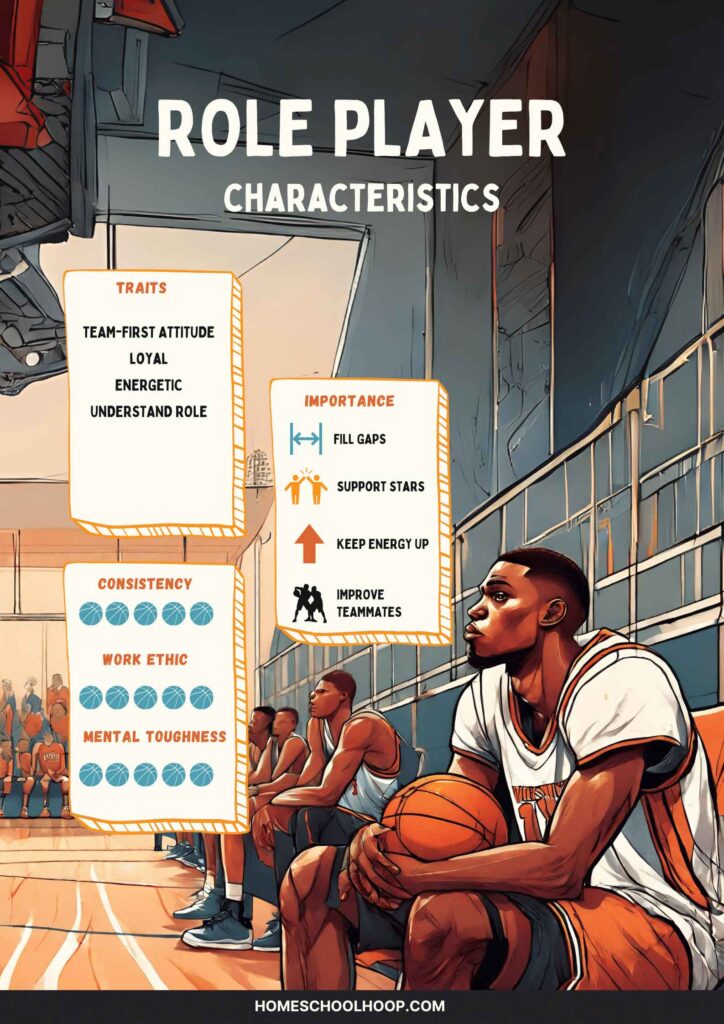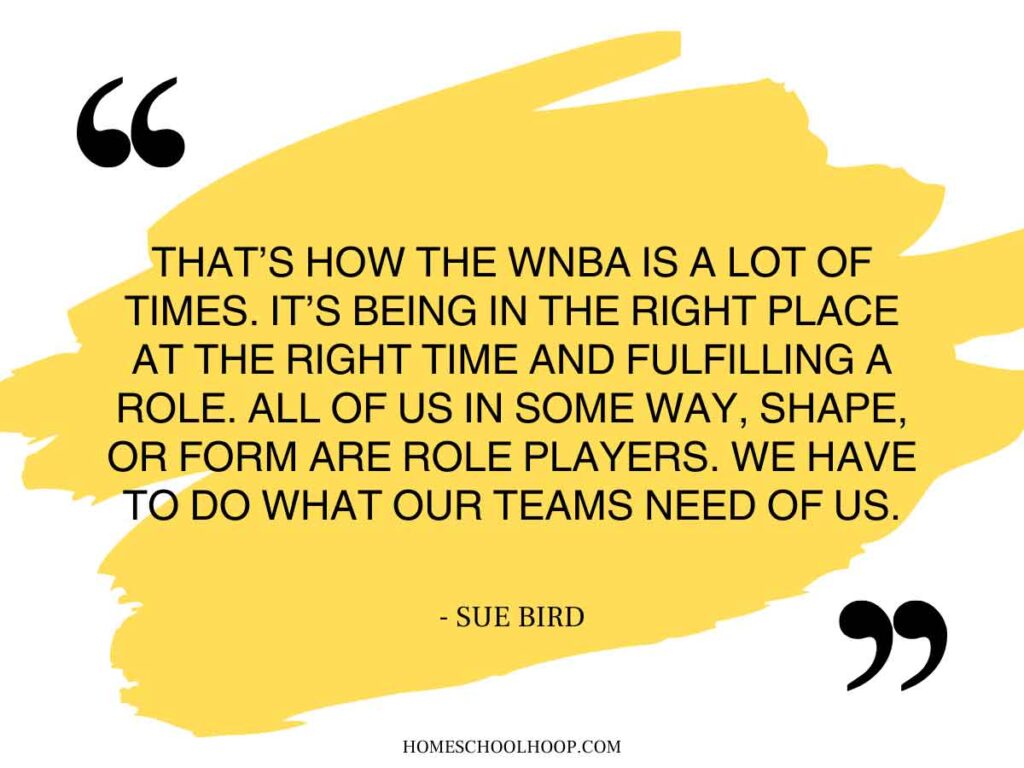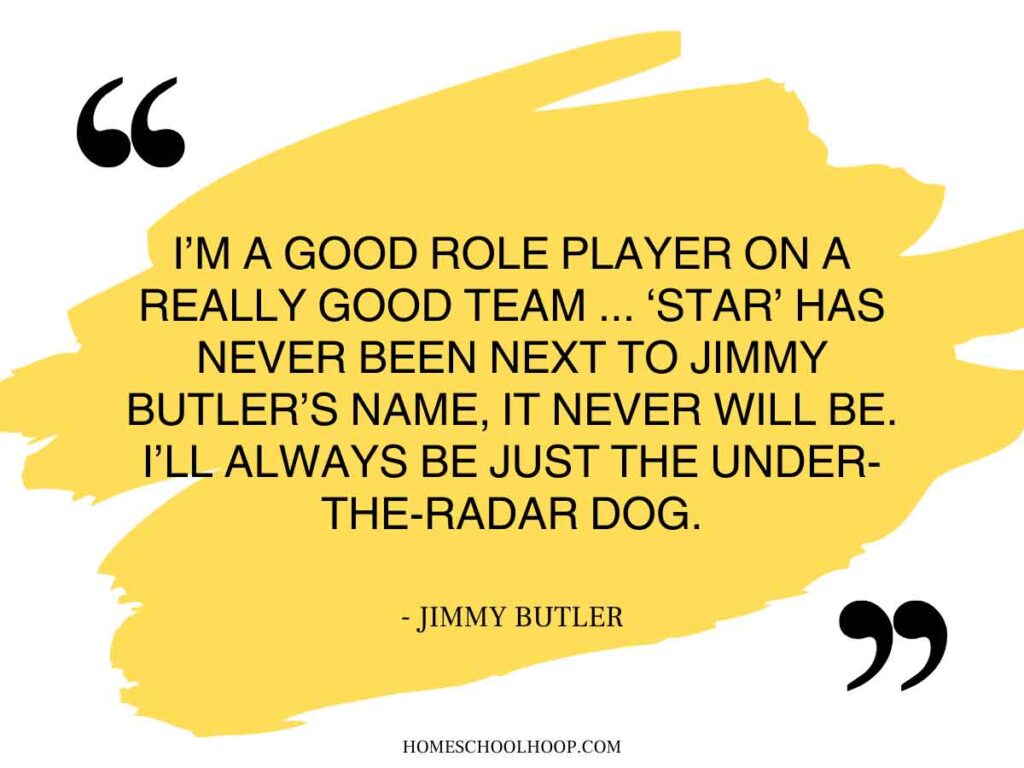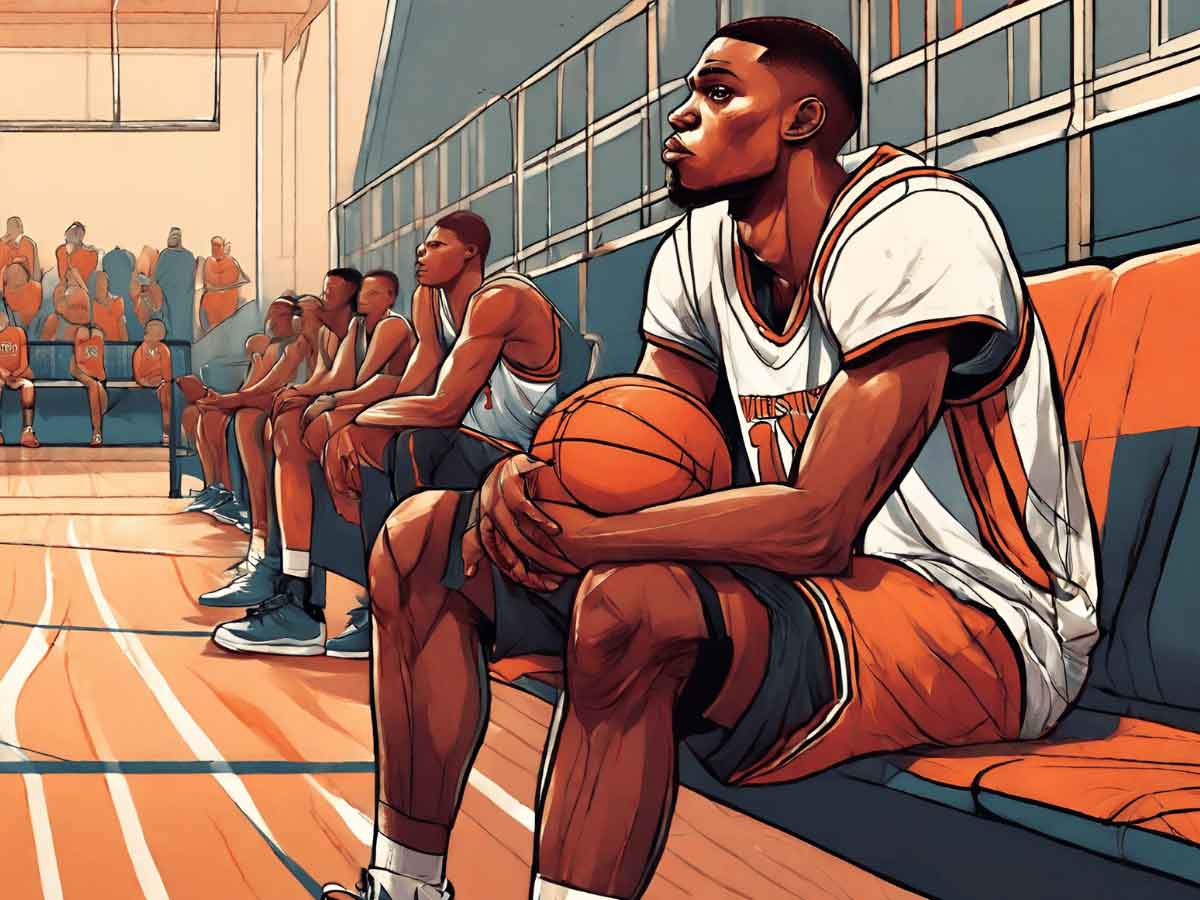Think of a successful basketball team like a puzzle – every player is an important piece. Among these essential pieces is the role player.
Michael Jordan, arguably the greatest basketball player ever, once said, ‘Talent wins games, but teamwork and intelligence win championships.’ And on a basketball squad, role players are the heart of this teamwork.
Key Takeaways:
- A role player in basketball is a player who specializes in specific skills to help the team win.
- These players are vital for balancing a team, often taking on defensive responsibilities or specific offensive roles, like ‘3-and-D’ specialists.
- While they may not always be the star players, their strategic importance can make or break a game’s outcome.
Role players might not grab headlines, but their impact is undeniable. From setting basketball screens to hitting crucial three-pointers, their quiet contributions are key to a team’s success.
In this article, we explore what makes a role player in basketball, the skills they bring to the court, and why every successful team needs these unsung heroes.
Definition of a Role Player in Basketball
A role player in basketball is someone who excels in certain areas of the game. They might not do everything, but what they do, they do very well. These players usually have a specific job or ‘role’ on their team and can be basketball game changers.
The Role of a Role Player on the Court
Role players are important because they fill gaps in a team’s skills. They might not be the main stars, but their abilities in these specific areas are vital for a team’s success.
Here are some of the different ways role players can contribute:
- Shooting: Some role players are excellent shooters. They can hit field goals from long distances, especially three-pointers, helping the team when points are badly needed.
- Rebounding: Other role players focus on rebounding. This gives their team more chances to score or limits their opponents’ scoring opportunities.
- Defense: Defensive specialists are role players who focus on stopping the other team from scoring. They might guard the best player on the other team, take charges, or block shots.
- Passing: Some role players are great at delivering assists. They can see the court well and contribute to offensive strategy by getting the ball to their teammates in a good position to score.
- Energy and Hustle: These role players are known for their high energy. They might dive for loose balls or make fast breaks when they’re in the game, or make a bench player impact by cheering on their teammates. They bring excitement and momentum to the game.
A common type of role player is the ‘3-and-D player‘. These players are excellent at shooting three-pointers (‘3’) and playing strong defense (‘D’). They are valuable because they contribute both offensively and defensively.
Characteristics of a Great Role Player

Not everybody has what it takes to be a role player. These players need special qualities that go beyond just being good at basketball.
It’s not just about their skills, but also about their mindset and attitude. Players with huge egos or a need to be the star need not apply.
Great role players have the following characteristics:
- Consistency: A great role player performs their specific skills reliably Whether it’s shooting, rebounding, or defending, they deliver steady performance game after game.
- Understanding Their Role: They know exactly what their job is on the team and focus on doing it well. This means not trying to do everything but excelling in their specific area.
- Team-First Attitude: These players put the team’s success above personal glory. They are willing to do whatever it takes to help the team win, even if it means less personal recognition.
- Mental Toughness: Role players often face tough situations, like guarding the best player or taking a critical shot. They need mental toughness to handle this pressure.
- Work Ethic: Great role players work hard consistently in practice and games. They are always trying to improve their skills and understand now they can best contribute to the team.
Importance of Role Players in a Team’s Success
A role player is just as important to a team’s success as the player with the highest PPG. Outside of American football, basketball arguably requires the most teamwork in sports.
Here are some ways role players in basketball make a difference:
- Fill gaps: Role players fill specific needs. If a team needs a clutch shooter or a strong defender, a role player can step up to fill that gap.
- Support the stars: A team’s stars can’t do it all alone. Role players support them by taking care of the less glamorous tasks, like playing defense or setting screens.
- Keep the energy up: Basketball is a game of momentum. Role players can fire up their teammates, whether from the bench or on the court.
- Improve their teammates: Players get better when they’re challenged. Role players can make their teammates work every day in practice, helping them develop their skills so they can dominate in games.
Consider the Golden State Warriors between 2015 and 2022. NBA players like Andre Iguodala and Draymond Green handled less glamorous roles like playing defense and setting screens to support stars like Stephen Curry so the team could win four championships over a seven year span.
In the WNBA, you’ve got players like Kiah Stokes, who embraced her role of rebounder and defensive anchor with the Las Vegas Aces. Often overlooked, Stokes is a selfless player who has an invaluable presence. She’s helped the Aces win back-to-back WNBA championships in 2022 and 2023.

Challenges of Being a Role Player
Being a role player in basketball comes with its own set of challenges. It’s not just about playing the game; there are mental hurdles too.
The biggest challenge for most is getting limited recognition. Role players have to be mentally strong and team-oriented. They don’t get as much attention as star players, despite being basketball game changers. This lack of recognition can be tough, especially when they contribute significantly to the team’s success.
Also, balancing their role on the team with personal ambitions is a challenge. Role players have to accept their specific role while also aiming to grow and expand their own capabilities as players.
Role players in basketball also can’t be scared to fail. They often have to perform specific tasks under high pressure. Making a key shot or defending against a top player can be stressful.
Lastly, role players are expected to deliver consistent performances. Being reliably good at their specialized role, game after game, is a demanding task.
Famous Role Players and Their Contributions
Every player contributes to their team’s success or failure. But in basketball, some role players have made a bigger impact in the NBA and WNBA. They may not be the biggest names, but their contributions have been invaluable to basketball team dynamics and winning.
Dennis Rodman (NBA)
Rodman is perhaps the greatest NBA role player of all-time. He was a rebounding powerhouse and defensive specialist, also bringing a fiery energy to every game. He played key roles in the success of the Detroit Pistons and Chicago Bulls, contributing successfully to their championship runs.
Alysha Clark (WNBA)
Clark, playing first for the Seattle Storm and then for the Las Vegas Aces, is another great example. Known for her shut-down defense and consistent scoring, she helped the Storm secure two WNBA championships before playing a crucial role in the Aces winning the championship in 2023.
Robert Horry (NBA)
Known as “Big Shot Rob,” Horry was famous for hitting key shots in important games (I’m still not over him draining that 3-pointer on the buzzer to beat the Kings in 2002). He played for several teams, including the Las Angeles Lakers and San Antonio Spurs, and was vital in winning seven NBA championships.
Natasha Cloud (WNBA)
Cloud, a guard of the Washington Mystics, is known for her defense, terrific passing, and playmaking. She’s also become her team’s spiritual leader and was instrumental in the Mystics’ 2019 championship win.

FAQs
What does the term “role player” mean in basketball?
In basketball, a role player is someone who specializes in certain skills to help the team. They focus on specific tasks like shooting, defending, or rebounding, rather than trying to do everything.
What makes a player a good role player?
A good role player is consistent, understands their specific role on the team, puts the team’s success first, and is mentally tough. They work hard and adapt to different game situations.
Can a role player become a superstar?
Yes, a role player can become a superstar. With hard work and improvement, some role players develop into star players (example: Kawhi Leonard). However, their main focus is usually on excelling in their specific role.
What is an NBA role player?
An NBA role player is a player in the National Basketball Association who specializes in certain skills. They support the team by excelling in specific areas like shooting or defense.
Who is the best role player in the NBA?
While identifying the best role player in the NBA is subjective, current players like Jrue Holiday, Draymond Green, Alex Caruso, Derrick White, and Gary Payton II are often mentioned for stepping into their team’s needs and making an impact.
Was Dennis Rodman a role player?
Yes, Dennis Rodman was a role player. He focused on exceptional rebounding and defense, playing a vital role in the success of the teams he played for, like the Chicago Bulls and Detroit Pistons.


